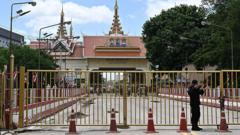Amid escalating political turbulence, the Constitutional Court of Thailand has suspended Prime Minister Paetongtarn Shinawatra due to backlash from a leaked conversation with the former Cambodian Prime Minister Hun Sen, which led to calls for her resignation. With her ruling coalition's stability already in jeopardy following a recent defection of a key ally, the court's decision adds to the political discontent, further challenging Shinawatra's governance as her approval ratings plummet.
Thai Prime Minister Paetongtarn Shinawatra Suspended Amid Controversy

Thai Prime Minister Paetongtarn Shinawatra Suspended Amid Controversy
Thai Prime Minister Paetongtarn Shinawatra faces suspension over a leaked phone call sparking public outrage and legal challenges to her leadership.
Thailand's political landscape has become increasingly volatile as Prime Minister Paetongtarn Shinawatra finds herself suspended by the Constitutional Court while it reviews a petition for her dismissal. The suspension follows the emergence of an audio clip featuring a private phone conversation between Shinawatra and former Cambodian leader Hun Sen, in which she referred to him as "uncle" and made disparaging comments about a Thai military commander. The incident ignited public rage, leading to demands for her to step down, and the court is now poised to deliberate on the matter.
This suspension could mark a significant shift in Thai politics, potentially making Shinawatra the third member of the influential Shinawatra family to be ousted from the premiership before completing their term in the last two decades. The court's ruling was made with a 7-2 vote, temporarily handing leadership duties over to the deputy prime minister while Shinawatra retains a role in the cabinet as the culture minister.
Apologies from Shinawatra have been issued, asserting her call with Hun Sen was intended to address long-standing border issues and foster peace, not personal gain. However, conservative lawmakers have strongly opposed her approach, accusing her of undermining national interests and appeasing foreign leaders.
Her leadership crisis follows a tumultuous period in which her predecessor, Srettha Thavisin, was also dismissed by the Constitutional Court, showcasing the judiciary's considerable influence over political affairs. Critics argue that the court's recurring interventions highlight a troubling trend in Thai politics, undermining democratic processes.
Titipol Phakdeewanich, a political science academic, noted the detrimental effect these court decisions have on public confidence in the political system, emphasizing the importance of fair representation in governance. Shinawatra's administration has struggled with economic challenges and recently saw her approval ratings plummet to a mere 9.2%, a stark contrast to the 30.9% she held earlier in the year.
The constitutional crisis unfolds as her father, the controversial former leader Thaksin Shinawatra, faces legal challenges linked to allegations of insulting the monarchy, with trials commencing simultaneously. Thaksin's political journey, which saw him return to Thailand in 2023 after years in exile, intertwines with his daughter's current predicaments, posing deep questions about the future of the Shinawatra clan's influence in Thai politics.



















